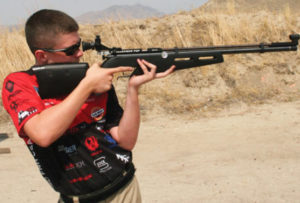In the aftermath of the Feb. 14 mass shooting at Marjory Stoneman Douglas High School in Parkland, Florida, that left 17 dead, a new immediacy was given to the gun control debate. Political rallies were held across the country demanding new laws and regulations related to gun ownership, and gun control advocates put pressure on companies to drop their commercial ties and affinity programs with the National Rifle Association (NRA).
 On May 2, the New York Department of Financial Services (DFS) became the first state-level regulator to target a company doing business with the NRA when it announced the insurance broker Lockton would pay a $7 million fine for administering NRA member insurance programs that the DFS said violated several state laws. One of the NRA programs provided by Lockton was Carry Guard, which was first launched in the spring of 2017 and offers NRA members personal liability insurance coverage should they be charged with a crime after using a firearm for self-defense.
On May 2, the New York Department of Financial Services (DFS) became the first state-level regulator to target a company doing business with the NRA when it announced the insurance broker Lockton would pay a $7 million fine for administering NRA member insurance programs that the DFS said violated several state laws. One of the NRA programs provided by Lockton was Carry Guard, which was first launched in the spring of 2017 and offers NRA members personal liability insurance coverage should they be charged with a crime after using a firearm for self-defense.
As part of the settlement, Lockton agreed to drop the NRA programs from its New York-based product lines. The DFS determined that no claims were ever filed under the Carry Guard program.
Michael Barry, head of media and public affairs at the Insurance Information Institute, a New York-based trade group, was unaware of other states following New York”™s lead in targeting the NRA”™s insurance offerings. “This was very unique to New York,” he said. “The DFS stated the broker violated four parts of New York state insurance law. Insurance is regulated at state level ”“ there is no federal involvement.”
One gun control advocacy group, Guns Down, has created advertising that demands the companies involved with Carry Guard ”“ Lockton Affinity, which administers the policy, and Chubb, the policy”™s underwriter ”“ end their affiliation with the NRA. However, the insurance industry has not been targeted by gun control advocates on coverage related to firearms.
“I don”™t think that insurance companies are experiencing any issues or concerns at this point,” Kim Marie DiMatteo, partner at DiMatteo Group in Shelton, said. “But that”™s not to say it may not be coming down the road.”
And while firearm insurance is not, by any stretch, a major product within the overall insurance market, it gets an increased level of attention whenever the gun control debate dominates the news cycle.
“The topic of carrying such insurance has been surfacing in my office a few times over the past couple of years,” Chris O’Brien, owner of O”™Brien Insurance Agency in New Milford and New Fairfield, said. “Certainly tragedies like Sandy Hook and Parkland are still very vivid and current in everyone”™s life, so this could be partially the reason for these inquiries.”
Although O”™Brien”™s agency is not involved in this type of policy, he acknowledged the value of the product to firearm owners. “In my opinion, when an individual decides to purchase a firearm, it would be prudent to consider such coverage,” he said. “It is important to note that this could very well be the only type of insurance that would respond to a firearm situation. If a citizen has a firearm in their home, it would be a good idea to read their homeowners insurance policy to familiarize themselves with what is covered and what is specifically excluded.”
Firearms owners have other choices besides the NRA Carry Guard program ”“ similar policies are being marketed through the U.S. Concealed Carry Association and CitizenDefend.com.
Another insurance product tied to firearms that is gaining attention is active shooter insurance. The first company to offer this was The Willis Group in 2015 ”“ as a policy aimed at universities ”“ but the product is now marketed to commercial properties. A recent report from the Reinsurance Association of America (RAA) noted that seven South Florida school districts purchased more than $3 million of active shooter coverage in the three weeks after the Parkland massacre.
“As more events like this continue to happen, the market growth of active shooter insurance will likely continue,” the RAA report said. “Unfortunately, this issue will continue to be on the forefront of the insurance industry for years to come.”
“A number of companies marketing active shooter insurance,” said Peter Kochenburger, executive director of the Insurance Law LL.M. Program at the University of Connecticut School of Law. “And it is not limited to schools.”
The relative newness of active shooter insurance has created some gray areas: the RAA report highlighted the absence of legislation or regulation addressing the writing and implementation of active shooter insurance policies, as well as the uncertainty “if damages resulting from an active shooter situation are covered or excluded by an insured”™s general liability or professional liability policy.”
And Kochenburger wondered if the product can offer genuine value.
“Yes, it potentially fills a gap,” he said, although he expressed concern that the insurance providers might be exaggerating the need for this specific policy. “The likelihood of a school or a place of business having this type of event is very small.”




















What you want to bet that old antigun rough lover AG, who just quit his position, had something to do with this?
Amazing. The very imbeciles who insist that insurance should be mandatory for firearms owners are sabotaging that very thing.
Hypocrisy, much? Or, is it this a carefully laid plan, i.e. you MUST have insurance, but you can’t HAVE ANY, hence you cannot have firearms.
Very transparent, very unconstitutional. The private companies can do whatever they wish, but the government is foreclosed from using it to deny constitutionally protected fundamental rights.